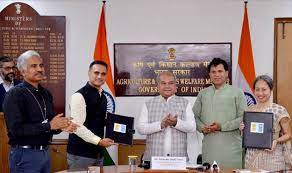Description

Disclaimer: Copyright infringement not intended.
Context
- The Ministry of Agriculture & Farmers Welfare (MoA&FW), the Government of India and the United Nations Development Programme (UNDP) have signed a Memorandum of Understanding (MoU) wherein UNDP will provide technical support towards the Centre’s aspirational Pradhan Mantri Fasal Bima Yojana (PMFBY) scheme & Kisan Credit Card – Modified Interest Subvention Scheme.
- Under the MoU, UNDP will leverage its expertise in systems and global know-how for supporting the Ministry of Agriculture in the implementation of combined agriculture credit and crop insurance.
About Pradhan Mantri Fasal Bima Yojana (PMFBY)
- It is in line with the One Nation – One Scheme theme- It replaced National Agricultural Insurance Scheme (NAIS) and Modified National Agricultural Insurance Scheme (MNAIS).
- Its objective is:
- To provide insurance coverage and financial support to the farmers in the event of failure of any of the notified crops as a result of natural calamities, pests & or diseases.
- To stabilize the income of farmers to ensure their continuance in farming.
- To encourage farmers to adopt innovative and modern agricultural practices.
- To ensure the flow of credit to the agriculture sector.
- The Scheme covers all Food & Oilseeds crops and Annual Commercial/Horticultural Crops for which past yield data is available and for which the requisite number of Crop Cutting Experiments (CCEs) are being conducted under the General Crop Estimation Survey (GCES).
PMFBY 2.0
- Toto ensure a more efficient and effective implementation of the scheme, and the central government revamped PMFBY in the 2020 Kharif season.
- Completely Voluntary: Enrolment is 100% voluntary for all farmers from 2020 Kharif.
- Limit to Central Subsidy: The Cabinet has decided to cap the Centre’s premium subsidy under the scheme for premium rates up to 30% for unirrigated areas/crops and 25% for irrigated areas/crops.
- More Flexibility to States: The government has given the flexibility to states/UTs to implement PMFBY and given them the option to select any number of additional risk covers/features.
- Investing in ICE Activities: Insurance companies have to now spend 0.5% of the total premium collected on information, education and communication (IEC) activities.
Kisan Credit Card
- The Kisan Credit Card (KCC) scheme was introduced in 1998 for providing adequate and timely credit support from the banking system under a single window with the flexible and simplified procedures to the farmers for their cultivation and other needs like the purchase of agriculture inputs such as seeds, fertilizers, pesticides etc. and draw cash for their production needs.
- The scheme was further extended for the investment credit requirement of farmers viz. allied and non-farm activities in the year 2004.
- KCC covers post-harvest expenses, produce marketing loan, consumption requirements of farmer household, working capital for maintenance of farm assets and activities allied to agriculture, and investment credit requirement for agriculture and allied activities.
- The Kisan Credit Card Scheme is implemented by Commercial Banks, RRBs, Small Finance Banks and Cooperatives.
About UNDP
- The United Nations Development Programme (UNDP) provides expert advice, and training grants support to developing countries, with an increasing emphasis on assistance to the least developed countries. It promotes technical and investment cooperation among nations.
- The UNDP Executive Board is made up of representatives from 36 countries around the world who serve on a rotating basis.
- It is funded entirely by voluntary contributions from member nations.
- UNDP is central to the United Nations Sustainable Development Group (UNSDG), a network that spans almost 170 countries and unites the 40 UN funds, programmes, specialized agencies and other bodies working to advance the 2030 Agenda for Sustainable Development.
- The UNDP is considered an executive board within the UN General Assembly (UNGA).
- It is headed by an Administrator.
https://www.pib.gov.in/PressReleasePage.aspx?PRID=1824812












